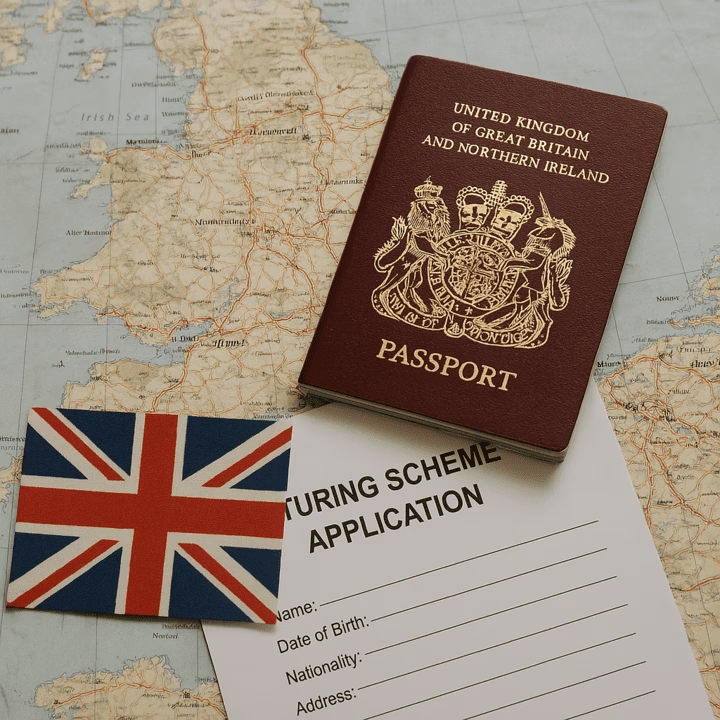🔎 Recap
Want the essentials? Here’s a quick breakdown of the WHV for France!

Introduction
Dreaming of an unforgettable year in France? Whether you want to work in a vineyard in Burgundy, explore the beaches of the French Riviera, or simply perfect your French, the Working Holiday Visa (WHV) is the perfect solution.
With this visa, you can stay in France for up to a year, fund your adventure with part-time jobs, and travel freely across Europe. It’s an incredible opportunity to combine work, travel, and cultural immersion. In this article, we’ll guide you through everything you need to know: how to apply, the benefits, and our tips to make the most of this unique experience.
Ready? Let’s dive in! ☺️
What is the WHV?
The Working Holiday Visa, also known as the Programme Vacances-Travail (PVT), is a temporary visa that lets you work in France while exploring the country. It’s designed for young adults who want to fund their stay with temporary jobs while discovering the cultural richness of France.
What You Can Do with a WHV
- Work: Earn money with seasonal jobs in hospitality, restaurants, or even vineyard harvests.
- Travel: Explore France and enjoy easy access to the entire Schengen area.
- Discover: Immerse yourself in French culture, experience a new way of life, and improve your French along the way! 😉
Who Can Apply for a WHV?
The WHV is open to young adults aged 18 to 30 (or up to 35 for some countries, like Canada) who meet the following criteria:
Eligibility Criteria
- Age: You must be between 18 and 30 years old (or 35, depending on your country).
- Valid Passport: Your passport must cover the entire duration of your stay.
- Financial Resources: You’ll need around €2,500 to cover your initial expenses.
- Return Ticket or Sufficient Funds: Be prepared to prove you can afford your return journey.
- Health Insurance: Mandatory insurance that covers medical expenses and repatriation.
Eligible Countries
France's Working Holiday Visa program is based on a bilateral agreement with fifteen countries and territories: Argentina, Australia, Brazil, Canada, Chile, Colombia, South Korea, Ecuador, Hong Kong, Japan, Mexico, New Zealand, Peru, Taiwan, and Uruguay.
Quotas
Except for Australia and New Zealand, the number of visas issued each year is limited and determined by agreements between participating countries. The current quotas are:
- 7,000 for Canada
- 2,000 for South Korea
- 1,800 for Japan
- 1,500 for Argentina
- 750 for Hong Kong
- 500 for Brazil and Taiwan
- 400 for Chile and Colombia
- 300 for Ecuador, Mexico, Peru, and Uruguay
For the latest updates on quotas and application conditions, check the official government website.
Start planning your stay in France with the Student Hub 🙌

How to Apply
Key Steps
- Check Your Eligibility: Review the criteria for your country.
- Prepare Your Documents: Passport, insurance, proof of financial resources, etc.
- Submit Your Application: Schedule an appointment with the French consulate.
- Wait for Approval: Processing times vary depending on the country and the time of year, so plan ahead!
Documents You’ll Need
- A valid passport.
- Proof of financial resources (around €2,500).
- Health insurance covering your entire stay.
- A return ticket or sufficient funds to purchase one.
- A motivation letter (required for some countries).
Rights and Obligations with a WHV
What You Can Do
- Work Freely: Take temporary jobs in various sectors without needing a work permit.
- Travel in the Schengen Area: Explore without restrictions.
- Immerse Yourself: Experience French culture and participate in local events.
What You Must Respect
- Local Laws: Always follow the rules and regulations in France.
- Visa Duration: Don’t overstay your permitted time.
- Insurance Coverage: Maintain valid insurance for your entire stay.
Tips for a Successful Experience
Finding a Job
- Look for seasonal or short-term jobs (CDD): grape harvesting, hospitality, restaurants.
- Use platforms like Indeed or local Facebook groups to find opportunities.
Planning Your Travels
- Before you head off, make sure you’re covered with travel insurance. It’s a small step that can really help if things don’t go as planned. Providers like Chapka, Heymondo, or SafetyWing offer flexible plans that are great for international students.
- Take advantage of regional transport passes for budget-friendly travel. There are plenty of ways to explore France without breaking the bank! For example, the SNCF youth discount card (Carte Avantage Jeune) offers up to 30% off train tickets — super handy if you're planning to travel often by train 🙌
Embracing Local Culture
- Immerse yourself: attend festivals, join local associations.
- If you’re interested in taking French classes, opt for FLE-certified schools.
Conclusion
The Working Holiday Visa is an incredible opportunity to combine travel, meeting new people, and working. Whether in France or elsewhere, the feedback we’ve received is unanimous: if you get the chance, don’t miss it!
Take some time to research which cities might interest you, plan your application process (2–3 months in advance), and go for it — you won’t regret it!
And if you need help organizing your stay, the International Student Hub is here to support you ☺️
-
🔎 Sources:









